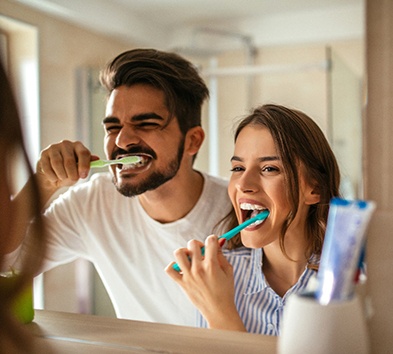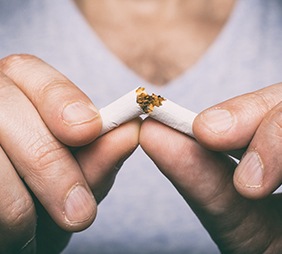Emergency Dentist — Alexandria, IN
Got a Toothache?
Call Us Today!

Dental emergencies can really throw a wrench in your schedule, especially if you’re experiencing significant discomfort. Most dental emergencies appear as a result of longstanding decay that turned into an oral infection or because of forced trauma from a bad fall or sporting accident. Regardless of how the emergency happens, you can expect Dr. Martinez, your trusted emergency dentist in Alexandria, IN, and his team members to see you as soon as possible – ideally the same day the emergency occurs. Don’t let your situation get worse; call our dental office to schedule an appointment!
Why Choose Martinez Dentistry for Emergency Dental Care?
- CEREC Crowns Available In-House
- Immediate Implant Options for Knocked-Out Teeth
- Gentle and Caring Dentist Dedicated to Your Needs
What to Do in a Dental Emergency

- When a dental emergency occurs, the first thing you should do after you’ve stabilized is give our dental office a call. Not only can you schedule an appointment as soon as possible, but you can get advice from our team on how to best manage your condition.
- Once you get to our office, one of our team members will check you in and Dr. Martinez will perform a detailed exam to find the source of the problem. On top of capturing any necessary X-rays, he will make sure to get you out of pain as soon as possible.
- Once the emergency exam is completed, he’ll go over his findings with you and start creating a treatment plan to address them. You’ll always know what the cost of your care will be ahead of time, so you’re never left with a surprise bill.
- Our team at Martinez Dentistry will work quickly to address your problem and protect your long-term oral health, whether that’s through a dental filling, crown, root canal therapy, tooth extraction, or another service.
The Most Common Dental Emergencies

Depending on the emergency you’re experiencing, there are certain steps you need to take to prepare yourself for the appointment, reduce discomfort, and ensure the best outcome possible. After you’ve scheduled an appointment, take a moment to find the dental emergency you’re experiencing below and see what you can do to improve your situation.
Understanding the Cost of Dental Emergencies

When the time comes to pay for treatment, it’s important to note that the cost will vary depending on the severity of your emergency. For example, if you only need to remove decay and have a filling placed to stop discomfort, it will cost less than treating an oral infection via root canal therapy. When you arrive, we’ll be better able to evaluate your condition, assess the current damage, and create a personalized treatment plan that meets your needs. The last thing you should do is put off necessary care!
How to Prevent Dental Emergencies

If you could protect your smile from the harm of a dental emergency, wouldn’t you want to? At Martinez Dentistry, we focus on equipping our patients with the tools and knowledge they need to keep their smile healthy and happy for their lifetime. We also realize that accidents do happen, which is why we offer emergency dental care as well. These situations can be stressful and a hassle to handle, which is why we’ve provided three precautionary measures you can take to help you avoid ending up with an unexpected visit to your emergency dentist in Alexandria.
Maintain Good Oral Hygiene Habits at Home

The most important preventive step you can take to ensure that you don’t end up with a dental emergency on your hands is to stick to a thorough dental hygiene routine. To keep your teeth and gums healthy, the ADA recommends brushing your teeth twice each day for two minutes with fluoride toothpaste, rinsing with antibacterial mouthwash daily, and flossing at least once every day. This will remove substances such as plaque, food debris, and bacteria from your mouth, which are all known to cause severe oral health problems.
Watch What You Eat

Many people don’t realize that something as simple as adjusting your daily diet can reduce your risk of damaging a tooth or developing a severe oral health problem. Even though your teeth are strong, chewy, sticky, and hard foods can wear them down and cause them to break or become damaged. Foods that are high in carbohydrates and sugars can also increase harmful oral bacteria accumulation, causing enamel erosion that exposes the more sensitive layers of your teeth. This increases the risk of infections and discomfort. By substituting processed snacks for healthy alternatives like fresh fruits and vegetables, you can reduce plaque accumulation and make sure that your teeth stay clean and healthy.
Break Bad Habits That Harm Teeth

Bad habits like nail-biting, using tobacco, and teeth grinding can all have a serious impact on the strength and health of your teeth. Here are some of the ways these habits could land you in your emergency dentist’s office:
- Nail-biting can cause enamel erosion that can leave your teeth vulnerable to being attacked by bacteria, resulting in infections and severe decay.
- Tobacco products are notorious for causing oral cancer and dry mouth. This side effect is serious because without your saliva to neutralize them, acids produced by bacteria can easily eat away at your teeth and cause discomfort.
- Even though many people who grind their teeth are unaware that they do it, it can result in fractured, broken, and severely damaged teeth.
Dental Emergency FAQs

Dental emergencies can be frightening and happen when you least expect them to. Luckily, having a trustworthy dentist by your side can significantly ease your nerves during these unfortunate situations. No matter what you’re dealing with, our team at Martinez Dentistry encourages you to call and ask any questions you may have. In the meantime, you can review the following answers to some of the most frequently asked questions we receive from patients.
Will My Toothache Go Away on Its Own?
No, most toothaches will not go away on their own. If you’re ever experiencing one, your best bet would be to schedule an appointment with Dr. Martinez. He’ll conduct an oral examination to rule out any possible causes for the toothache. With the help of a professional, you can address and treat the underlying problem before it turns into a severe complication.
Should I Visit the Emergency Room First for Dental Emergencies?
Believe it or not, most emergency rooms are not able to properly address dental emergencies. That’s mainly because they usually don’t have a dental professional on staff. Therefore, you should always head straight to the dentist’s office anytime you’re having problems with your oral health. Of course, an ER visit would be a better option if you have a jaw fracture, serious laceration to the face or mouth, or an abscess that’s swollen to the point of affecting breathing and swallowing.
What Should I Keep in My Emergency Dentistry Kit?
It’s always a good idea to be prepared for the unexpected. You should keep an emergency dentistry kit with you at all times that contains the following:
- Small sealable container for teeth or restorations
- Cotton balls
- Denture adhesive
- Petroleum jelly
- Anti-inflammatory medication like ibuprofen
- A topical anesthetic like Orajel
- Floss
- Ice pack
- Your dentist’s contact information
What Does Chronic Bad Breath?
Everyone has had bad breath at some point in their lives. However, some people may experience it for longer than just in the morning or after eating a pungent meal. Chronic bad breath typically indicates an underlying issue that can’t be addressed with mints, mouthwash, or even oral hygiene. Some common causes of halitosis (chronic bad breath) include cavities, gum disease, and dental infections. If you have persistent bad breath and it doesn’t go away after a few days, you should contact Dr. Martinez and make an appointment. He’ll examine your mouth to ensure there are no developing problems.
I Need a Checkup & Cleaning I am Worried About Bleeding Gums I Have a Cavity or Broken Tooth I am Missing One or More Teeth I Want to Enhance My Smile View Our Services
